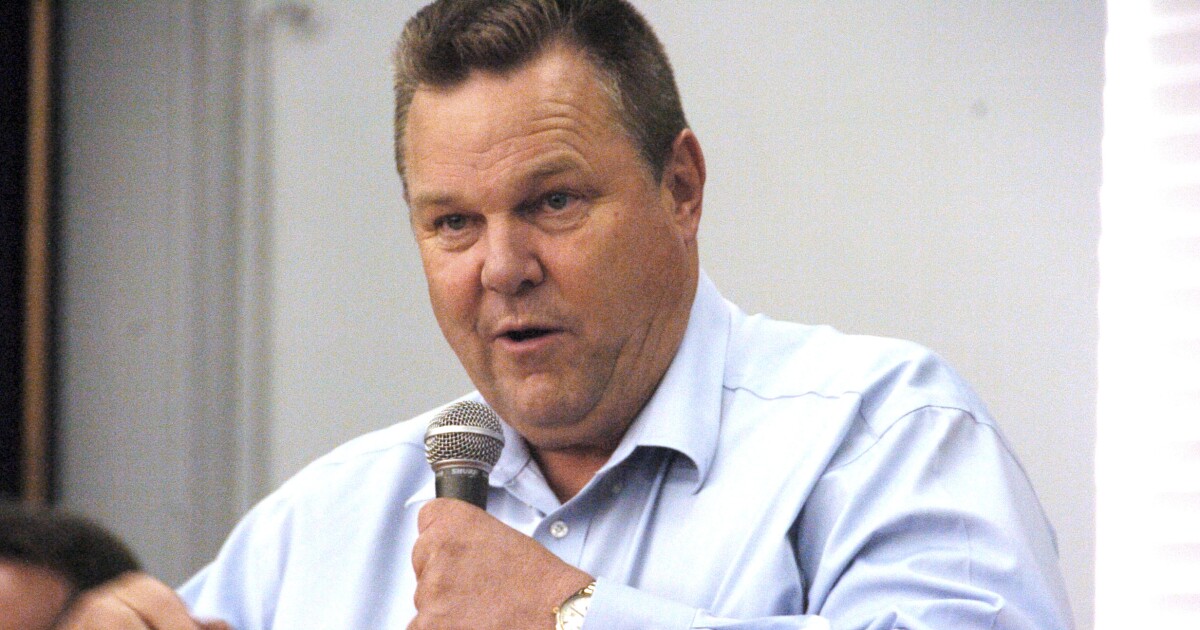

Republicans in Montana and across the country are zeroing in on a prize that has constantly been out of reach: the Senate seat held by three-term Sen. Jon Tester (D-MT) that is up for grabs in 2024.
Even though Tester does not yet have any official opponents on the GOP side, the primary field of candidates who could run against him is already getting a lot of attention. Top Senate Republicans are hoping for Tim Sheehy, a successful businessman and a military veteran who is the founder of Bridger Aerospace, valued at $869 million last year. The other Montanan in the Senate, Steve Daines (R), is leading Republicans’ efforts to take back control of the upper chamber next year and likely needs to beat Tester to do so. According to several Republican sources, Daines, the Senate GOP campaign arm chief, has encouraged Sheehy to run.
GOP CANDIDATE QUALITY QUESTIONS RETURN IN TOP-TIER MONTANA SENATE RACE
Both of Montana’s Republican House members are weighing whether to run against Tester, Reps. Ryan Zinke and Matt Rosendale. Zinke recently returned to the House after serving as interior secretary in the Trump administration, a position he resigned from amid ethics violations.
Rosendale, one of the most conservative House members, is still mulling a second run for Senate against Tester after failing to unseat the Montana Democrat in 2018. Rosendale has emerged as the preferred candidate of the Club for Growth, a conservative political organization that has been a major player in Republican primaries in recent election cycles. State Attorney General Austin Knudsen has also emerged as a potential candidate.
“Montana has flipped red in the last two cycles where we’ve been a real purple state. We’ve got a good bench, you might say. We have some really good candidates,” said Don Kaltschmidt, chairman of the Montana Republican Party. “Whoever wins the primaries, we believe any of those candidates can beat Mr. Tester.”
That could set up a potentially bruising primary battle between four Republicans who have expressed interest in the seat. National Republicans are treading lightly in an attempt to stave off damaging primary battles and candidates that may not appeal to a wide swath of voters in a general election, cautious not to repeat the 2022 cycle, when poor general election candidate quality contributed to a disappointing election wherein Democrats expanded their majority by a seat. Republicans in Montana and across the country maintain that some of the candidates who are considering running have a better shot at beating Tester than others.
“I do think there is a hunger on the part of Republicans to not repeat the same mistakes of the past. I think that Sheehy brings an opportunity to maybe move in a different direction and finally be able to beat Jon Tester,” Erik Iverson, a former chairman of the Montana Republican Party, said. “I think that’s where the attractiveness of his sort of candidacy is really rooted in the fact that we’ve tried some of these things in the past, you know, run people who have already lost to Tester.”
“Others like Austin Knudsen, a great candidate but sort of new to statewide elected office, maybe he runs for reelection as attorney general and that sets him up down the road, a little patience exercise there,” Iverson added.
Other Republicans in the state have been a bit more specific about the candidates they would like not to pursue a run for Tester’s senate seat.
“Sheehy is our top choice. Rosendale and Zinke are less than ideal candidates, and I think most people around here would prefer they step aside,” said a Montana Republican who preferred to remain anonymous to reflect candidly on the landscape of the looming race.
Tester has proven to be a difficult candidate to oust for Republicans. In 2006, Tester beat an incumbent Republican senator. He also easily defeated GOP challengers in 2012 and 2018. In some of his previous races, he’s been successful in depicting opponents as not true Montanans. In 2018, his campaign tried to brand the Baltimore-accented Rosendale as an outsider, slamming his Maryland roots and calling him “Maryland Matt.” In 2012, he highlighted GOP opponent, then-Rep. Denny Rehberg’s lobbyist ties and a 2010 lawsuit he pursued against the Billings Fire Department for the way it handled a wildfire on his land, casting the lawsuit as a slight to firefighters.
Republicans in the state said they hope future GOP campaigns will focus on highlighting Tester’s voting record. An analysis from CQ found Tester’s “party unity” score, which measures how often he broke ranks with Democrats, was 2.9% in 2022, meaning he voted with Democrats 97.1% of the time. The Montana Democrat had the sixth-lowest Democratic unity score last year.
“I don’t think we’ve done a really good job in the past with the senator,” Kaltschmidt said. “If we just show how he votes to the Montana voter, they’re going to get it, and they are already getting it. We’re already working on that and getting that message out there. It all comes down to the fact that he’s a fake moderate.”
Iverson believes that a potential Sheehy candidacy would pose the largest threat to Tester because he believes the Montana Democrat has never faced someone of the same caliber.
“Tester is used to running against politicians. He’s only ever run and beaten and demonized politicians. An outsider with a decorated military background as a job creator, who has the ability to self-fund if he needs to, I think makes him a very attractive candidate,” Iverson said.
“His bio is almost Tester’s worst nightmare because Tester really has some strength with the veteran’s community in Montana, particularly in Western Montana, which allows him to do better than Democrats normally do. But, it’s going to be very difficult for him to take the veteran and military vote away from somebody with a background like Sheehy,” Iverson added.
MONTANA REPUBLICANS AIM TO TURN SENATE ELECTION INTO TWO-PARTY CONTEST
Montana Republicans in the state legislature are attempting to pass a new bill that would rewrite the rules exclusively for the state’s next U.S. Senate race. The system would mirror California’s primaries, in which all candidates would appear on the same ballot, and the two candidates that get the most votes would face off in a general election. The bill passed the Montana Senate last week narrowly, with seven Republicans voting against it.
According to several Montana Republicans contacted by the Washington Examiner, the idea for the legislation originated in Washington, with some saying the bill came directly from Daines himself. Mike Berg, a spokesman for the National Republican Senatorial Committee, declined to weigh in on the proposed changes or whether national Republicans were involved.
“I can tell you one thing: Montanans don’t like when Washington meddles in our affairs. I think this is a terrible idea, one that could backfire with libertarians in our state,” a Montana Republican said.
Supporters of the legislation said it lowers the prospect of the election being spoiled by a third-party candidate and ensures Montana’s next senator would win their election with more than 50% of the vote.
“Jon Tester, of the three times he’s ran, he barely got over 50%, one time. The other times, he was below 50%. We just believe that a U.S. senator that serves the longest term, longest-elected official in the state of Montana, six years, should have the majority of Montana voters,” Kaltschmidt said.
Some Montana Democrats see the proposed changes to election law for this one specific Senate race as a sign Republicans don’t feel confident about their prospects in 2024.
“I think the proof is in the pudding just with what Steve Daines is trying to attempt here with the top two primary,” Bob Funk, a Montana Democratic political operative, said. “I think that shows that Steve Daines doesn’t think that they can beat Jon Tester without changing the rules for one specific race, for one specific year.”
“They are trying to move mountains and literally change election law in an attempt to beat this guy, which means they clearly don’t see him as vulnerable,” Funk, who has worked on behalf of both Democrats and Republicans but most recently has sided with Democrats in the last couple election cycles, said.
CLICK HERE TO READ MORE FROM THE WASHINGTON EXAMINER
In 2024, Democrats will be defending three Senate seats in red states that backed former President Donald Trump in 2020, and losing just two of them would be enough for the majority to slip out of their hands. It’s clear Democrats are aware of this fact. Tester’s reelection campaign announced on Tuesday that he has already raised $5 million in the first quarter of 2023.
“I’m humbled by the enormous support our campaign has received from across the state and from hardworking Montanans, like our teachers, veterans and farmers,” Tester said in a written statement.





